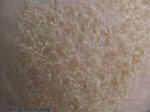The Mixed Results Of Eczema and Food Allergy Studies Can Be Confusing. Is There A Link?
Studies on Eczema and Food Allergy have been done and they never seem to agree.
There are differing reports on whether food plays any part in eczema outbreaks.
It is thought that someone with one or more of the atopic diseases are more likely to develop an allergy or intolerance to certain foods.
One of the food allergy symptoms is a skin rash. Also one of the main symptoms of eczema.
Other symptoms include sneezing, vomiting, migraines and wheezing.
An allergy or intolerance causes problems with the digestion of certain foods.
It cannot cause eczema if you haven’t already got it.
Though it can cause a flare-up if you are already a sufferer.
There are certain foods which are reported to be more likely to be a problem for someone with eczema. You can read about the most Common Food Allergies here.
If you think you have a food allergy one of the first things you can do is to keep a food diary. You list everything you eat and when you eat it. Also you can note any reactions you have and when they occur. It may help to work out a pattern.
You can also visit your doctor. If you have a good idea what is causing the reaction they may suggest an allergy test. This will let you know if your suspicions are correct. It can also let you know how sensitive you are to that food.
An elimination diet is another way that is used to work out what could be causing the reaction.
Food Elimination Diet
A food elimination diet could help you work out the link between your eczema and food allergy.
Suspected allergens are removed from your diet. This is normally for 7 days, but can be up to a month.
Then around every 7 days a food is brought back into the diet. This 7 day space allows enough time to notice any reactions brought on by that food.
That is a basic explanation. Your doctor or dietician would come up with a detailed plan for you to follow.
It should never be done off your own back. Always get medical advise and supervision. This is especially important if it is a child who may have a food allergy. The doctor or dietician will make sure that malnourishment doesn’t occur. They will be able to give you a detailed list of what can and cant be eaten.
Once it has been established what is the cause of your allergies you can take steps to remove them, and any products they are in, from your diet.
It is not just the food itself that can cause a reaction. Especially if it is processed.
Although nowadays most foodstuffs have some type of chemical in them. Coming from either how they are grown or from added preservatives and additives. These chemicals are just as likely to irritate the skin.
Going organic is a good way to go. But we all know that the cost of organic food is an issue. With fruit and vegetables you could always buy from a local source or try growing your own. The main thing is to cook from scratch, wash fruit and veg and stay away from problematic food.
My Personal Story Of Eczema and Food Allergy
I have had a mild problem with my eczema and food allergy. I think it is more of a food intolerance.
I have noticed over the years that a couple of foodstuffs, when they are eaten, sometimes cause an outbreak of my eczema, including
- Cheese, especially hard cheese
- Cola, which could be because of the high amount of chemicals in it
- Strawberries, the fruit itself, and jam is also a problem
If like me you have hand eczema you will probably of noticed some inflammation when you have contact with some things. This type of eczema is usually Irritant Contact Dermatitis
My condition is triggered off by
- Citrus Fruits
- Onions and Garlic
- Cheese
- Raw Meat
Your triggers could be any food. It is normally pretty simple to pinpoint the offenders. The skin is generally irritated straight away.
When handling food it is a good idea to wear gloves. Going for the disposable latex free ones is the best option.
If you think you may suffer from eczema and food allergy read about the most Common Food Allergies. It will help you to recognise the most likely culprits of your allergy or intolerance. It will also give you ideas on how to cut out or reduce them from your diet.
Return from Eczema and Food Allergy to Triggers of Eczema
Return from Eczema and Food Allergy to What is Eczema
Search What Is Eczema?
Advertising on What Is Eczema?
We are a participant in the Amazon Services LLC Associates Program, an affiliate program which allows sites to earn fees by advertising and linking to amazon.com. If you make a purchase through a link on this page, I may receive a small commission, at no extra cost to you. Many thanks
